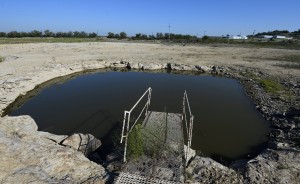It’s Aggie vs. Aggie on the Science of Climate Change

EPA/LARRY W. SMITH /LANDOV
A small pool of water is all that remains in a portion of Bridgeport Lake, which is over thirty feet (9 meters) below normal levels, in Bridgeport, Texas, USA, 04 September 2013.
A massive new report on climate change got a lot of attention this past week. It’s message? Climate change is already happening and having an impact, and it’s going to get worse. The section of the report on Texas found that droughts, heat waves and flooding are all set to become even more extreme as greenhouse gases pile up in the atmosphere and change the climate.
The report was the work of hundreds of scientists and experts, the most extensive look at climate change’s impacts on the country to date. But that wasn’t good enough for the state agency in charge of protecting Texas’ environment.
A statement from the Texas Commission on Environmental Quality (TCEQ), which is in charge of guarding the state’s air and water, said all this science on man-made climate change (which at this points totals thousands of studies and the consensus of 97 percent of the scientific literature) is … wait for it … “far from settled:”
The agency’s statement reads:
“There has been no significant global warming in more than 15 years, although carbon dioxide levels continue to rise. It is clear that the science of global warming is far from settled. Regulatory policy cannot be set without firm guidelines and the proven cause and effect that would dictate policy.”
Perhaps the head of the TCEQ, Bryan Shaw, would be interested to learn that his own alma mater, Texas A&M University, also had a study out this week on the matter, also finding that climate change is here. The study found evidence supporting “higher rates of climate change and more warming over the coming century,” according to a press release from the university. Shaw, appointed to the TCEQ by Governor Rick Perry, actually taught in the Biological and Agricultural Engineering Department at A&M, with a focus on air pollution engineering.
The entire faculty of the Atmospheric Sciences department at A&M, which studies the climate, strongly disagrees with Shaw and the TCEQ. They’ve all signed a statement on climate change, with a consensus on the following points:
- “It is virtually certain that the climate is warming, and that it has warmed by about 0.7 deg. C over the last 100 years.”
- “It is very likely that humans are responsible for most of the recent warming.”
- “If we do nothing to reduce our emissions of greenhouse gases, future warming will likely be at least two degrees Celsius over the next century.”
- “Such a climate change brings with it a risk of serious adverse impacts on our environment and society.”
Shaw and the TCEQ’s position that the science of climate change is “far from settled” ( a stance shared by many other Republican leaders in Texas, including the Governor) is an interesting, but flawed, bit of linguistic jujitsu. Since much of science is never “fully” settled, even a scientific consensus of 97 percent on climate change isn’t enough, because it still leaves that three percent up in the air. Trying to predict what the climate will become with perfect certainty as we pass record levels of greenhouse gases in the atmosphere is also impossible, giving skeptics more room to sow doubt.
Apply the logic of 97 percent certainty to a roulette table that could have a massive impact on humankind and its economy and well-being, however, and you’d be a fool not to take the bet.
So why ignore the science, even with that niggling three percent uncertainty? The second half of the TCEQ’s statement on the national climate report this week offers as clear a window as any into how the agency approaches it’s mission of protecting public health and natural resources. It’s all about protecting money first:
“The NCA [National Climate Assessment] global warming policy will greatly reduce the use of coal for energy generation. This will negatively impact the reliability of the electrical grid, and will also increase energy costs. It will particularly impact energy prices for those who can least afford it, such as the elderly and the poor. This is the true environmental impact of the war on coal.”
In the eyes of Texas regulators charged with protecting our air and water, the “environmental impact” they’re the most concerned about is higher energy prices. (Never mind the fact that coal power is on the decline in the U.S. largely thanks to fracking and a new abundance of domestic natural gas supplies, not regulation.)
We asked the agency Friday to clarify how higher energy prices constitute an “environmental impact,” but have yet to hear back.
Andrew Dressler, a professor of atmospheric sciences and author of the new A&M study, said while announcing his findings last week that climate change will continue. He put it simply: “Our society needs to accept the science and begin thinking about what to do about it.”
